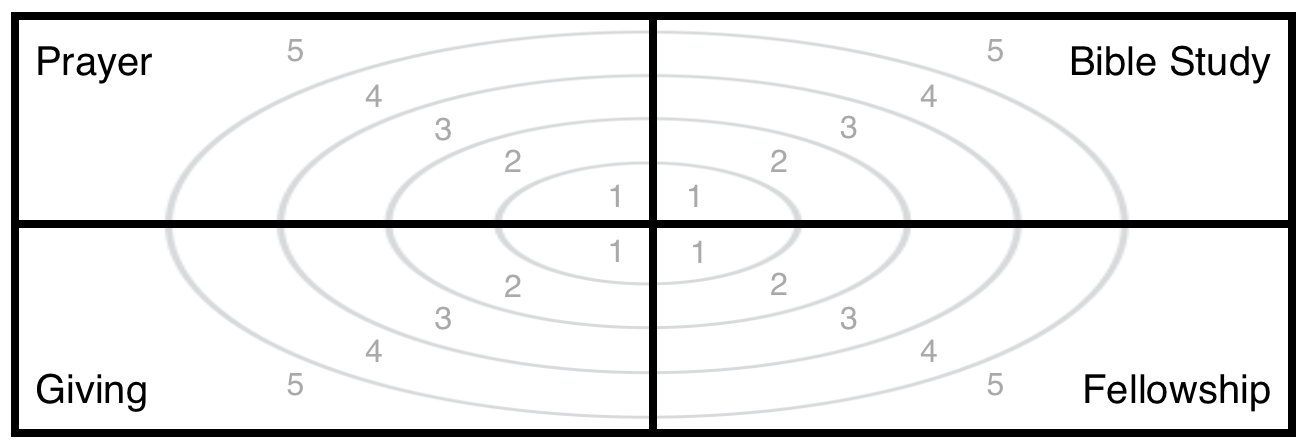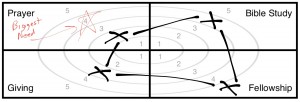Thank you for stopping by CrossEyedLife… don’t forget to bookmark this site, subscribe to the right, and/or download the free app to enjoy future CrossEyedLife posts: GET THE APP
This blog is a follow-up to a teaching at CrossPoint church on pursuing spiritual maturity. Whether or not you are a CrossPointer, please use the resources that follow for your own discipleship journey!

Spiritual maturity is both a goal and a discipline. Make no mistake, I know it is God who gives us growth, but we can’t ignore all of God’s instruction from His word that puts some responsibility on us. These responsibilities are what we call disciplines.
The figure above is a very nonscientific way of analyzing what area of your spiritual life probably needs the most attention.
First, put an “X” on the number in each of the four boxes below that best reflects where you are in that area of spiritual discipline. Use the scale of 1=“not great” up to 5=“outstanding”. Second, connect the points to form a box. You’ll begin to see a picture of where your spiritual disciplines are weakest (like in the figure to the right).
Use the scale of 1=“not great” up to 5=“outstanding”. Second, connect the points to form a box. You’ll begin to see a picture of where your spiritual disciplines are weakest (like in the figure to the right).
There’s not one cure-all to spiritual maturity deficits, but one thing is for sure… if we don’t do anything, we will not grow. So after you’ve mapped your journey using the tool below, and you have identified your greatest area of need, look to the corresponding category and make some plans to introduce a new discipline to your life.
Let me suggest you only work on one thing at a time. Do not hesitate to get in touch if you would like additional help: email.
Prayer
We have been told that prayer is as natural as just having a conversation, so many of us feel guilty if this is not a strong area of our life. Well, don’t!
Even the disciples who walked with Jesus, chosen by Him, asked Jesus to teach them how to pray. We all have to learn. ( Luke 11:1)
Add the discipline of prayer to your life by committing to 10 minutes of prayer every day using the following the following model for the next 21 days. Why 21? Because we know 21 actions create a habit, and we’re trying to develop a discipline.
This practice should lead you to deeper, longer, more meaningful and less formulaic prayer, but if this is how Jesus taught His disciples, then it’s probably good for us as well.
Jesus gave us a model for prayer in Matthew 6:9-12 when He said,
9“Pray then like this: “Our Father in heaven, hallowed be your name.”10 “Your kingdom come, your will be done, on earth as it is in heaven.” 11 “Give us this day our daily bread,” 12 “and forgive us our debts, as we also have forgiven our debtors.” 13 “ And lead us not into temptation, but deliver us from evil.”
- Adoration (vs 9) – Tell God how amazing He is and thank Him for everything.
- Submission (vs 10) – Agree God is right, and your job is to yield to Him.
- Provision (vs 11) – Ask God to provide, acknowledging the difference between needs and wants.
- Confession (vs 12) – One by one, admit to God where you have fallen short.
- Protection (vs 13)- Ask Him for specific direction and protection in your life.
Download the “Reading It Right Bible Study and Prayer Card” here: 
Bible Study
We call the Bible God’s word because we believe that God gave us a book that is truly His word to us. So, any plan for spiritual maturity must include Bible reading and study whether you consider yourself a “reader” or not.
We practice a method called Reading It Right in which we use the Bible itself to help us learn how to read the Bible.
Add this discipline to your life by making a commitment to read a short passage each day by using this method below for the next 21 days. Why 21? Because we know 21 actions create a habit, and we’re trying to develop a discipline. May I suggest you use a personal journal to write down the four responses to each study and maybe even keep track of prayer requests.
2 Timothy 3:16 says,
“All Scripture is God-breathed and is useful for teaching, rebuking, correcting and training in righteousness, 17 so that the man of God may be thoroughly equipped for every good work.”
This passage indicates that every word of the Bible is designed to provide us 4 things: teaching, rebuking, correcting and training. So, reading the Bible becomes a conversation with God in which we discover what each passage means in line with these purposes.
- The Bible is useful to teach, or as we like to call it, summarize. First, discover the basic teaching in the passage. It’s not about deep insight or personal application. Simply, discover the headline, or put the main thought in a nutshell.
- The Bible also will rebuke us, or put another way it will expose. Next, get honest about how this passage evaluates our lives. The Bible challenges thoughts and actions. When it happens, you may feel vulnerable and exposed. Don’t be defensive, be real. However, the Bible may instead affirm and encourage, if we are already in line with it’s teaching.
- Additionally, God loves you too much to leave you the same way so He will correct you which we call change. Making a change is about doing something specific, making adjustments. In light of God’s Word, we discover some things we need to stop and some we need to start. Making these changes will be an uphill climb, but worth every step.
- Finally, God’s word is designed to train us for the future, what we call prepare. This is about seeing the direction God’s Word is taking you. The result of this process is being one step further in spiritual maturity. God has a plan for your life, and the Bible is preparing you for something. Discover/dream/pray what it might be.
In summary, read a short passage, and then journal your responses to summarize, expose, change and prepare. Most importantly, apply it to your life that day! Whatever is exposed and whatever needs to change, get it done!
If you want to take your Bible study to the next level, please connect with the Reading It Right material online, or pick up your copy of the book/journal at a CrossPoint campus or here.
Download the “Reading It Right Bible Study and Prayer Card” here: 
Giving
If your first thought is, “Giving is not really a discipline,” then you’re not familiar with giving. There is sacrifice, there is planning, there’s prioritization, and there is much heart/thought in the discipline of giving.
God does not ask us to give because He needs it; He asks us to give because He knows we need to learn how to sacrifice.
Add this discipline to your life by making a commitment to give to your local church in their weekly offering every week for the next 21 visits you make there. Why 21? Because we know 21 actions create a habit, and we’re trying to develop a discipline.
There are two reasons the local church needs to be the destination of your giving: First, it is a biblical mandate that we bring the whole tithe into the storehouse (Malachi 3:8). Second, if we give simply to places and things that we choose, we may be avoiding the issue of sacrifice altogether.
Here are some guidelines to help you start the discipline of giving:
- Start Somewhere – 10% (or tithing) maybe the best practice spiritually, but the reality of our financial situations often does not allow for that kind of obedience. So, until we get ourselves to a financial place of obedience through discipline in spending and good stewardship decision-making, the goal should be to start somewhere. Simply waiting until things get better is a procrastination technique that means you will never start.
- Sacrificial – wherever you begin your bringing journey it should be sacrificial. The point of making an offering by bringing his that it is a sacrifice. Sacrifice means your life should somehow be required to adjust, and that alone will help you continue to remember the God, who has provided for you on a more regular basis.
- Consistent – the key to any discipline is to be consistent in its practice. Scriptures teach in the book of 1 Corinthians (https://biblia.com/books/esv/1Co16.2) that we are to decide each week what we would like to set aside to give. That’s why we take an offering each week at CrossPoint. It gives you the opportunity to practice your personal sacrifice of worship by “bringing” your gift once a week.
Fellowship
It takes very little reading in Scripture to realize that God never intended us to be Christians alone. Our culture allows us to be anonymous, encourages us to be independent and celebrates the Lone Ranger. This is NOT what the Bible teaches for God’s people.
Establishing a discipline of fellowship, in the very same way, cannot be done alone. The book of Acts described early believers as being in one large fellowship and committed to one another personally.
These two tiers are best represented today by church membership and grow group participation.
You may have any number of reasons why you choose not to participate in either church membership or some smaller fellowship, but whatever you come up with you will find yourself arguing against God’s word.
Do not forsake the gathering together of yourselves. (Heb 10.24-25)
They devoted themselves to one another and the teaching (Acts 2.42-47)
I was glad when they said unto me let’s go to the house of the Lord (Ps 122)
To add this discipline to your life, let me suggest two things that will have ongoing, perhaps even lifelong effects.
- First, join a local church. In our context to join a church requires that you be a follower of Jesus Christ, be baptized as a testimony of your faith and have taken our church membership class. To request information from CrossPoint on the next membership class email here and tell us which campus you attend: email
- Second, join a Grow Group. This may be one of the most difficult things you do, stepping outside of your comfort zone and committing some time and energy. However, the rewards are disproportionately larger than the sacrifice. Living life together, supporting one another and growing in community… it’s all part of God’s plan. To request information from CrossPoint on Grow Group email here and tell us which campus you attend: email
Conclusion
Spiritual maturity is a gift of God and a responsibility of the believer. I hope that you will take one of these disciplines and begin to pray actively through it and observe it in your life. There is no doubt in my mind if you do this, you will see maturity.
Philippians 1:6
6 And I am sure of this, that he who began a good work in you will bring it to completion at the day of Jesus Christ.



 Use the scale of 1=“not great” up to 5=“outstanding”. Second, connect the points to form a box. You’ll begin to see a picture of where your spiritual disciplines are weakest (like in the figure to the right).
Use the scale of 1=“not great” up to 5=“outstanding”. Second, connect the points to form a box. You’ll begin to see a picture of where your spiritual disciplines are weakest (like in the figure to the right).